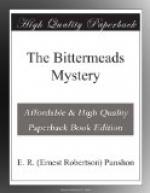He began to laugh again and Dunn laughed, too, for while he was not sure what it was that amused Deede Dawson, there were certain aspects of all this that bore for him a very curious and ironic humour.
“All right,” he said. “You bring me face to face with Rupert Dunsmore and you won’t have to grumble about the result, for I swear only one of us will go away alive. But how are you going to do it?”
“I’ve my plan, and it’s simple enough,” answered Deede Dawson. “Though I can tell you it took some working out. But the simplest problem is always the best, whether in life or in chess.” Again he indulged in a low and guarded outburst of his thin, mirthless laughter before he continued: “I suppose you know Rupert Dunsmore is one of those restless people who are never content except when wandering about in some out of the way place or another, as often as not no one having the least idea of his whereabouts. Then he turns up unexpectedly, only to disappear again when the whim takes him. Lately he has been away on one of these trips, but I happen to know he is coming back almost at once—what’s the matter?”
“I was only wondering how you knew that,” answered Dunn, who had given a sudden start.
“Oh, I know, never mind how,” Deede Dawson said. “I know that tomorrow afternoon at four o’clock he will be waiting by the side of Brook Bourne Spring in Ottom’s Wood, near General Dunsmore’s place. Which is as out of the way and quiet and lonely a spot as you could wish for.”
“And you have information that he will be there?” Dunn said incredulously. “How can you possibly be sure of that?”
“Never mind how,” answered Deede Dawson. “I am sure. That’s enough. My information is certain.”
“Oh, it is, is it?” Dunn muttered. “You are a wonderful man, Mr. Dawson. You know everything—or nearly everything. You are sure of everything—or nearly everything—but suppose he changes his mind at the last moment and doesn’t come after all?”
“He won’t,” answered Deede Dawson. “You be there and you’ll find him there all right.”
“Well, perhaps,” said Dunn slowly. “But what I want to know is why you are so sure? There’s a good deal hangs on your being right, you know.”
“I only wish I was as certain of everything else,” Deede Dawson said.
“Oh, all right,” exclaimed Dunn. “I suppose you know and you may be right.”
“I am,” Deede Dawson assured him. “Listen carefully now, there mustn’t be any blunders. You are to make an early start tomorrow. I don’t want you to take the car for fear of its being seen and identified. You must take the train to London and then another train back immediately to Delsby. From Delsby you’ll have an eighteen-mile walk through lonely country where you aren’t likely to meet any one, and must try not to. The less you are seen the better. You know that for yourself, and for your own sake you’ll be careful. You’ll




